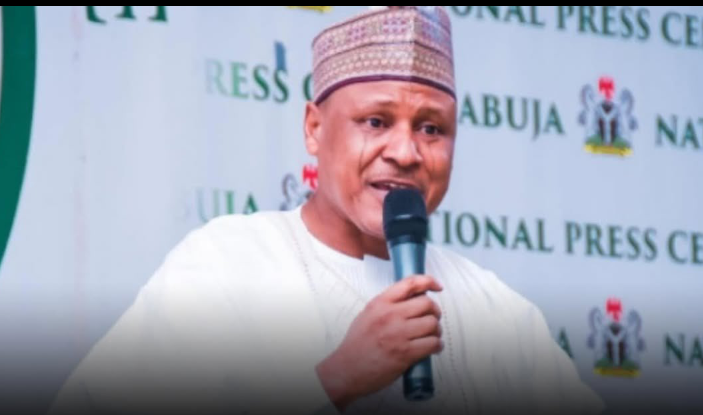
“Nigeria Is Not a War Zone of Faiths”: Minister Mohammed Idris Faults US Lawmakers Over False Genocide Claims

Nigeria’s Minister of Information and National Orientation, Mohammed Idris, has strongly refuted claims by some United States lawmakers alleging that Christians in Nigeria are facing genocide, describing the allegations as misleading, unfounded, and based on distorted data. Speaking in an interview with CNN, the minister stated that the assertions made by certain members of the US Congress grossly misrepresent Nigeria’s security realities and risk deepening the very divisions the country has worked hard to overcome.
According to Idris, the allegations of a “Christian genocide” in Nigeria are not only inaccurate but also dangerous, as they create a false narrative that could undermine peace and unity among the nation’s diverse population. The minister explained that while Nigeria, like many other nations, grapples with insecurity and violent attacks in some regions, these incidents are not driven by religious differences but by broader socio-economic and criminal motives.
“Yes, there are Christians being attacked, but these criminals also target Muslims, especially in the northern region,” Idris clarified. “To claim that these attacks are part of a systematic religious genocide is misleading. What we are facing are violent crimes carried out by criminal elements who have no respect for religion, ethnicity, or humanity.”
The minister’s comments came in response to recent appeals by some US lawmakers urging the US Secretary of State to impose sanctions on Nigeria for alleged persecution of Christians. Idris dismissed the calls as misguided and rooted in a misunderstanding of the country’s complex internal dynamics. He emphasized that Nigeria’s Constitution guarantees freedom of religion and human rights for all citizens, and that the government remains fully committed to upholding these principles.
He stressed that painting Nigeria’s security challenges as religiously motivated conflicts does a disservice to both Nigerians and international observers seeking to understand the true nature of the issues at hand. “Portraying the situation as Christians versus Muslims is dangerous and inaccurate,” Idris warned. “It feeds into the propaganda of criminals who want to exploit religion to divide our people and destabilize communities.”
Idris also cautioned that the spread of such misinformation by influential foreign politicians or advocacy groups could have real consequences on the ground. According to him, labeling Nigeria as a country engaged in religious genocide not only misguides global policy but also emboldens extremist groups seeking to manipulate religion for violence and power. He urged international partners to seek context and rely on verified data from credible institutions rather than politically motivated reports or social media campaigns that lack objectivity.
“The United States has been a strategic ally to Nigeria, and we appreciate their support in our fight against terrorism and insecurity,” Idris said. “However, it is important that such a partnership be guided by facts, not falsehoods. When data is manipulated to fit a certain narrative, it can lead to misguided policy decisions that harm both sides.”
In his remarks, Idris highlighted the efforts of President Bola Tinubu’s administration to combat terrorism, banditry, and other forms of violent crime that have plagued parts of the country for over a decade. He explained that since taking office, the Tinubu government has ramped up investments in security infrastructure, intelligence gathering, and regional cooperation to address the root causes of violence, including poverty, unemployment, and environmental degradation.
“Our government is not in denial of the challenges,” the minister said. “We have inherited a complex situation, but we are working tirelessly to restore peace and stability across all regions. The military, police, and other security agencies have been empowered and are recording significant progress. Communities that were once displaced are beginning to rebuild, and life is returning to areas that were previously under threat.”
He further pointed out that Nigeria’s diversity—both ethnic and religious—has long been its strength rather than its weakness. From the bustling streets of Lagos to the farming villages of Kaduna, Nigerians of all faiths coexist, trade, and celebrate together. Idris emphasized that the narrative of a divided nation is a deliberate distortion, often amplified by those who do not understand Nigeria’s cultural complexity or who seek to exploit it for personal or political gain.
“Millions of Nigerian families include both Christians and Muslims,” he noted. “Our daily lives are intertwined. The idea that there is a government-sponsored or systematic campaign against Christians is false. Such claims undermine the genuine efforts being made to promote peace and unity.”
The minister also took aim at some international media outlets for amplifying stories that paint Nigeria as a country consumed by religious violence without properly investigating their sources. He called on journalists to adhere to ethical standards and seek balanced perspectives before publishing reports that could incite fear or prejudice. “Sensationalism has no place in responsible journalism,” Idris said. “When stories are exaggerated or stripped of context, they can inflame tensions and create distrust between communities.”
Nigeria, he maintained, remains one of the most religiously tolerant countries in Africa, with freedom of worship enshrined in its Constitution and observed across states. Mosques and churches often sit side by side, and interfaith marriages and community collaborations are common. Idris said this reality is far removed from the grim picture painted by some international reports.
While acknowledging that the government still faces challenges in fully eradicating violent crime, he reaffirmed that Nigeria’s approach is to confront insecurity through unity, dialogue, and development, not through the divisive lens of religion. He urged the international community to support these efforts constructively rather than relying on misinformation that could strain diplomatic ties or fuel resentment among Nigerians.
“The fight against terrorism and crime is not a Christian or Muslim battle—it is a national struggle for peace, justice, and security,” he concluded. “We urge our friends abroad to stand with us based on truth, not propaganda.”
Observers say Idris’s remarks reflect growing frustration within the Nigerian government over what it perceives as unfair labeling of its internal issues by foreign entities. Several analysts agree that while Nigeria continues to battle insurgency and insecurity, attributing the crisis solely to religious persecution oversimplifies a far more intricate situation involving economic inequality, land disputes, political grievances, and transnational criminal networks.
As the debate continues, one thing remains clear: the minister’s message is a call for nuance, for facts over fear, and for partnership grounded in mutual respect. In his words, Nigeria is not a war zone of faiths—it is a resilient, diverse nation striving, against all odds, to heal and to grow in unity.


